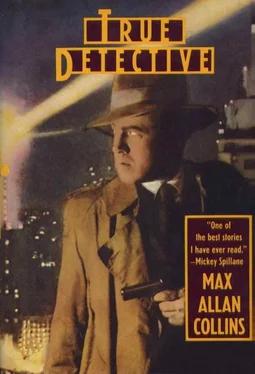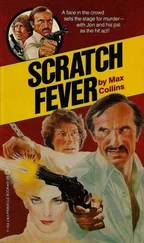“Jimmy hung around with some of Nick Coin’s boys,” Wall said, “in particular Vince Loga.”
“Know where I could find Loga?”
“A speak. Not this one.”
“Oh?”
“He ain’t here. Trust me.”
It seemed prudent to do so. I had left Reagan at the bar, where he sat nursing a beer, studying some of the sad faces around him. In the car, he said, “Lot of those guys are out of work. Mighty sad situation.”
“They found dough for a drink, though, didn’t they?”
“You’re awful cynical, Mr. Heller. Doesn’t it make you feel a little sick inside, when you see out-of-work men on street corners?”
“On street corners, yes. In bars, no.”
“Well, somebody’s got to do something about it.”
“Oh yeah? Like what? Like who?”
“I can tell you what I do. Every day when I walk up the hill to the station, I give ten cents to the first guy who asks for it.”
“If it’s the same guy every day, you’re getting taken.”
“Very funny. I got plenty of guys to choose from, believe me. Well, the president’ll straighten this out.”
“Voted for him, did you, Dutch?”
“I’ll say I did. And so did my father. He’s even working for the government.”
“Your father? Doing what?”
“Giving out scrip to the unemployed to exchange for food.”
We hit a couple of roadhouses on the outskirts of Davenport, both of them on the rough side: chicken-wire ceilings and sawdust on the floor and factory and foundry workers who liked to fight when they got drunk; I was glad I was with a husky former football player, even if he was wearing glasses and a sweater. Then we headed for a place Reagan had heard of but never been in, on highway 6, a route that took us along the Mississippi and through several little towns. The night was clear, the full moon reflecting off the smooth surface of the river, turning it an eerie gray.
Reagan asked me about Jimmy, and I filled him in. He said he could sympathize with the frustration Jimmy must’ve felt, going from newspaper to newspaper looking for work.
“I had swollen feet from pounding the Chicago sidewalks,” he said. “And I got all the reception-room fast shuffles you’d expect. It was a woman at NBC in Chicago who told me to head for the sticks. Even then, I was damn lucky, landing that WOC spot.”
“How’d you manage it?”
“The station had been advertising for an announcer, but I showed up the day after they filled the slot. It was Mr. Beame who gave me this news, after I’d driven seventy-five miles in my father’s car. Instead of staying cool, I kind of lost my temper, and asked him how the hell a guy can get to be a sportscaster if he can’t get inside a station? And mentioning sports did it — they needed somebody to help announce some Iowa games, and that’s how I started. Five bucks per. And that’s where I met Jack Hoffmann, who was Jimmy Beame’s drinking buddy.”
“And you ended up taking Hoffmann’s place at the station.”
“More or less. Oh, he was a capable man, and he could ad-lib and all that, but he didn’t know football. Still, I learned a lot from him, and he went off to find something in radio that wasn’t sports.”
“You like your work?”
“Sure. I wouldn’t mind being the next Quin Ryan or Pat Flangan. Of course, my dream’s to get into acting, not that this job isn’t acting ‘A chill wind is blowing through the stadium and the long blue shadows are settling over the field.’”
“Not bad,” I admitted.
The roadhouse was up ahead, a white two-story building on the right, with a gravel lot full of cars and a small blue neon out front that said FIVE O’CLOCK CLUB. I pulled in.
This was not a workingman’s joint, at least not the men who worked in the area’s factories and foundries. The men at the bar were in suits and ties and hats, as were the ones at tables with women in low-cut and/or tight-fitting dresses who might have been working girls, but didn’t, I thought, work here; this seemed to be a place you brought a moll. It was modern-looking: black and white and chrome with subdued lighting, a nightclub atmosphere. A five-piece band was doing some Dixieland jazz on a small platform over in the far left corner; they sounded like the reason Bix left the area.
The bartender was heavyset and pockmarked, but his apron was clean, which was a first for the evening. I asked him if he knew Jimmy Beame, and he said no. I asked him if he knew Vince Loga and he said no. I gave him a fin and asked again. He still didn’t know Jimmy Beame, but Vince was in back playing cards.
He pointed to a door at the rear and I headed there, Reagan next to me, the eyes behind the dark-rimmed glasses blinking as he tried not to look down the pretty necklines at the tables we passed, and considering the size of some of the guys sitting at the same tables as those necklines, that was a wise decision. As I reached to open the door, a bouncer the size of a Buick drove over and advised me the game was closed. I gave him a buck, opened my coat to show him I wasn’t armed, and he opened the door for me, and I went in.
He stopped Reagan. Said to me, “You gave me one buck. If he goes in, I want another.”
I didn’t feel like giving him another, so I told Reagan to stay out there.
The room was smoky and the low-hanging shaded lamp cast its pyramid of light across the green-felt, money-strewn table. Six people were playing; the game was poker. Five of the men had their coats off, ties loosened, hats on, except a hatless, dark-haired dude who had his back to me, and had kept his fancy pinstripe on. I waited till the end of the current hand and said, “Who’s Vince Loga?”
A guy about twenty-two with the sort of bland, baby-faced looks that could, in company like this, mean somebody with something to prove, was right across from me.
“I’m Loga,” he said, not looking at me, looking instead at the cards being shuffled to his left. “I’m also busy. I also don’t know you. Beat it.”
The dude with his back to me turned and it was George Raft.
He stood and smiled at me, extended a hand, which I took. “Heller,” he said. “What the hell are you doing here?”
“You’re asking me?” I said. “I’m on business. What are you doing? Making a movie? Sequel to State Fair , maybe?”
“I been in the Tri-Cities for three days,” he said. “Makin’ stage appearances at the Capitol with Pick Up. That’s the new movie. You know, I came here from Chicago Saturday; stopped in with Max Baer and saw Barney while I was in town — didn’t he mention it?”
“No, but I was kind of busy last week.”
“Yeah, I know. I saw the papers.”
“Can I have a word with you, George? In the other room?”
“Sure.”
We stepped out into the other room, where Reagan was waiting at the bar. I introduced Raft to him and the kid was grinning ear to ear; he’d apprently never met a big Hollywood star before.
“Look, George. I could use a favor.”
“Name it.”
“Tell that guy Loga I’m okay. Tell him he can level with me.”
“Okay. You mind telling me what it’s about, first? I don’t want the whole story, mind you. Just an idea of what kind of limb I’m out on.”
“It’s just a missing persons case. It doesn’t connect with anything big that I know of.”
“Fair enough.” He turned to Reagan. “You like that announcing racket?”
“Sure,” Reagan said. “But I’d like to be an actor, like you, Mr. Raft.”
Raft’s smile, as usual, was barely there. “Well, be an actor if you like; but don’t be one like me. Listen, if you do go out to Hollywood...”
“Yes?”
“Lose the glasses.”
Читать дальше












